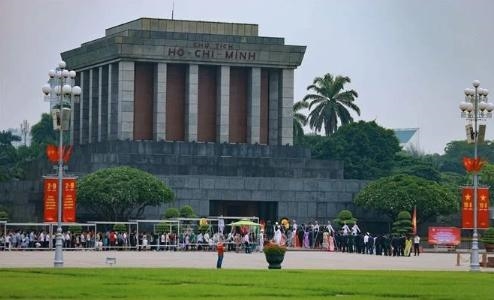    |
 |
|
People visit the Ho Chi Minh Mausoleum. |
The ordinance is the highest legal document so far to institutionalize Party and State's policies on the long-term preservation of and absolute safety for President Ho Chi Minh's body and the management and protection of the Ho Chi Minh Mausoleum complex.
The ordinance designates the Ho Chi Minh Mausoleum complex as a national landmark of exceptional political, historical, cultural, defense and security significance. It encompasses the Ho Chi Minh Mausoleum and Ba Dinh Square, the Memorial to Heroic Martyrs, the K9 historical site and supporting facilities, essential for the long-term preservation and absolute security of President Ho Chi Minh’s remains.
Long-term preservation and absolute protection of President Ho Chi Minh's body include medical and technical preservation activities, scientific and technological activities, inspection and assessment of the status of President Ho Chi Minh's body.
The Ministry of National Defense is assigned to issue detailed regulations on ensuring security and safety for President Ho Chi Minh’s body.
President Ho Chi Minh was born on May 19, 1890 in Kim Lien commune, Nam Dan district, Nghe An province. He devoted his whole life to the cause of national liberation, while tirelessly striving for peace and progress around the world.
He led the struggle for national independence and established the Democratic Republic of Vietnam, now the Socialist Republic of Vietnam, in 1945.
The President passed away in 1969. His body was embalmed and placed in a glass coffin inside the granite mausoleum.
The mausoleum has become an important landmark of the capital city and is integral to the political and social history of Vietnam.
Source: VNA